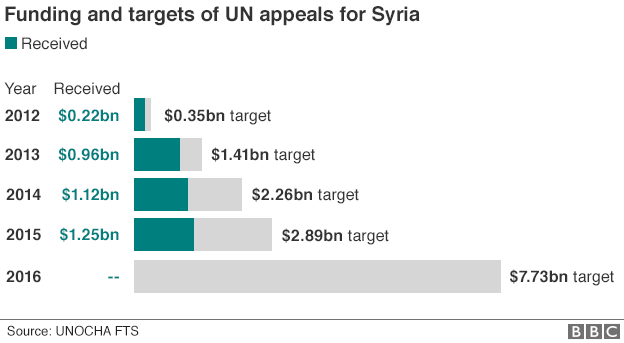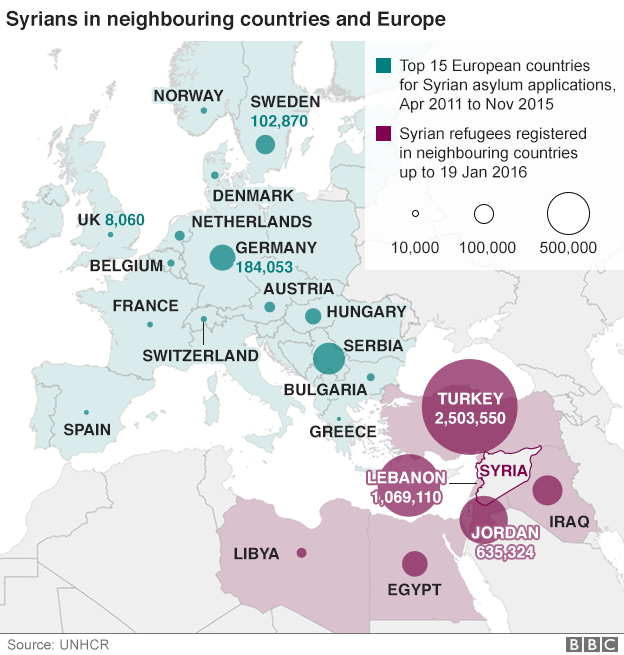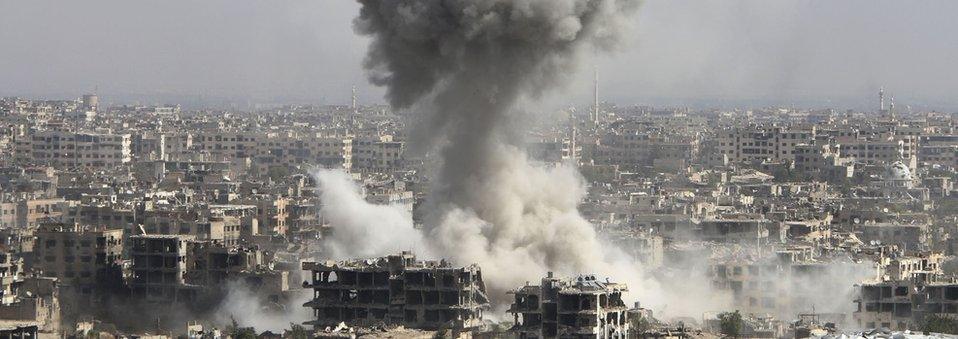Syria civil war: Donors pledge billions in vital aid
- Published
Rami Ruhayem reports from Damascus on the Syrian children displaced within their own country
Billions of dollars have been pledged to help ease the plight of Syrians affected by the five-year conflict.
At a donors' conference in London, dozens of countries committed to help reach the target of $9bn (£6.2bn). The EU pledged $3.3bn (€3bn; £2.3bn).
UK Prime Minister David Cameron told the conference: "There is a critical shortfall in life-saving aid."
The gathering has been overshadowed by the suspension of peace talks in Geneva and intense fighting on the ground.
A Syrian government offensive, backed by Russian air strikes, is continuing north of Aleppo.
Turkish Prime Minister Ahmet Davutoglu said an estimated 70,000 Syrians fleeing the bombing were moving towards Turkey.
The horrifying statistics that define Syria
Sixty countries are represented at the conference, external, including 30 world leaders. They are aiming to help the 4.6 million refugees and 13.5 million people in need of humanitarian assistance inside Syria.
"The situation in Syria is a close to hell as we are likely to find on this earth," said UN Secretary General Ban Ki-moon.
This conference, the fourth of its kind, is focusing its efforts on providing jobs and schools for the millions of refugees in countries bordering Syria.
"If ever there was a moment to take a new approach to the humanitarian crisis in Syria surely it is now," said Mr Cameron, mentioning the huge number of Syrians who "fear they have no alternative than to put their lives in the hands of evil-people smugglers in search of a future".
Delegates from Turkey - which hosts the largest number of refugees, 2.5 million - Jordan and Lebanon said their societies needed long-term support in order to adapt to the influx from Syria.
Calls for better access to education and jobs, external for the refugees were also made by a coalition of more than 90 humanitarian and human rights groups meeting in London on Wednesday.


The UK pledged an extra $1.7bn until 2020, Germany committed to $2.6bn until 2018, France said it would give $1bn and the US pledged an extra $925m for 2016.
Australia, Belgium, Italy, Poland, Japan, the UAE, Austria, Switzerland, Estonia, Denmark and Finland also committed funds.
European Council President Donald Tusk said the EU would commit €3bn this year and intended to "maintain this level of financing" for 2017 and beyond.
He said the European Investment Bank would also "play its part", offering to lend as much as €23bn "for the whole of the Middle East and North Africa".
The $9bn being sought on Thursday is made up of a UN appeal for $7.7bn, external and about $1.3bn requested by regional host governments.
Part of the reason for the record request is the underfunding of previous appeals. Only 43%, external of the $2.9bn pledged to the UN's 2015 appeal has so far been funded.

Hours before the conference began, peace talks between the Syrian regime and opposition were suspended, amid rebel anger over the continuing Russian bombing around Aleppo.
The UN-brokered talks, which opened just two days ago, are expected to resume on 25 February. Staffan de Mistura, the UN's special envoy at the talks, admitted there had been a lack of progress but said that the negotiations had not failed.
UN chief Ban Ki-moon said the talks were "undermined by the continuous lack of sufficient humanitarian access, and by a sudden increase of aerial bombings and military activities within Syria".
He urged the warring sides to "get back to the table, not to secure more gains on the battlefields".

Blame game over collapse of Syria talks
Middle East newspapers apportion blame to a variety of sources for the suspension of the third round of peace talks in Geneva.
Ali Ibrahim Mattar in Iran's Arabic-language newspaper al-Vefagh takes aims at Saudi Arabia: "Saudi Arabia wants to make political solutions fail and sabotages any talks, in addition to its support for terrorist groups to destabilise Syria".
In Syria's state-run al-Thawrah daily, Ahmad Hamadah says: "The US Secretary of State [John Kerry] and his aides flock to the Swiss capital… and behind closed doors impede all options for a solution."
Qatar's pro-government al-Rayah newspaper says: "Damascus, Moscow and pro-Syrian President Bashar al-Assad's sectarian militias made the Geneva talks fail from day one. These talks were stillborn."
Nasri al-Sayigh in the pan-Arab leftist Al-Safir daily bemoans the absence of the Syrians themselves - the refugees, displaced and missing - whilst the Saudi pro-government paper al-Watan says "Russian air strikes suspend Geneva 3 until 25 February".

In Syria on Thursday:
A Russian officer helping Syrian government troops with a new weapons system was killed when so-called Islamic State (IS) militants fired mortars at a Syrian army garrison on Monday, the Russian Defence Ministry said
Four Russian Sukhoi Su-35S fighters - a new model delivered to the Russian air force just a few months ago - are now flying combat missions in Syria
Syrian state TV has shown civilians greeting government troops in a Shia Muslim town north of Aleppo, after the troops pushed rebels back from a key supply route.

What is the Syria conflict?

Why is there a war in Syria?
Anti-government protests developed into a civil war that, four years on, has ground to a stalemate, with the Assad government, the so-called Islamic State group, an array of Syrian rebels and Kurdish fighters all holding territory.
Who is fighting whom?
Government forces concentrated in Damascus and the centre and west of Syria are fighting the jihadists of Islamic State and al-Nusra Front, as well as less numerous so-called "moderate" rebel groups, who are strongest in the north and east. These groups are also battling each other.
How has the world reacted?
Iran, Russia and Lebanon's Hezbollah movement are propping up the Alawite-led Assad government, while Turkey, Saudi Arabia and Qatar back the more moderate Sunni-dominated opposition, along with the US, UK and France. Hezbollah and Iran are believed to have troops and officers on the ground, while a Western-led coalition and Russia are carrying out air strikes.
